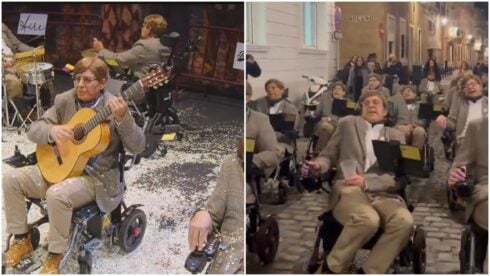Spain is probably the most permissive and sex obsessed country in Europe, discovers Tremlett
WHEN it comes to sex surveys, I am used to Cosmopolitan or its glossy equivalents. Spain, however, has the state-run National Statistics Institute. The instituto has discovered the following: more than one in four Spanish men under 49 have had sex with a prostitute during their lives, while one in seventeen have done so over the past year. “Both figures are noticeably higher than those observed in other surveys in Europe,” the investigators comment. The instituto did not dare say it directly, but it was calling Spanish men the most enthusiastic brothel johns of Europe. Could that be true?
I decided I would have to visit one of those gaudily lit clubes de alterne, to find out.
El Club Romaní, a huge, neon-lit pile of granite and slate – half French chateau, half Galician country pazo – sits in an industrial estate near Valencia. This was my first-ever visit to a brothel, whose names variously include S’candalo, Falcon Crest and Hotel Elvis.
I had spotted these clubs before. Who could miss them? Lit up with multi-coloured displays of neon, they shout their presence out loud. Newcomers wonder what these fanfares of pink, red, green and blue light that they see up and down Spain’s highways mean. Spaniards, however, know they can mean only one thing.
I am not sure what I was expecting, but it certainly was not this. It was early afternoon and the club was still empty. We had wandered through the bar area and into a small corridor. A sliding door had been pushed aside and I was staring at a large, round bed covered with a bright yellow bedspread. Some colourful, crocheted cushions and stuffed scarlet love hearts were scattered on it.
Circling the bed was a sort of padded crash bar. In fact, lined up below the erotic prints on the walls, there were a whole variety of bars and handles.
“This is the room that has been adapted for discapacitados, for the disabled,” announced the man in the black leather jacket, half-proud, half-amused. There was an en suite bathroom, with a ramp into the shower. The toilet had all the bars a disabled person could hope for.
But the pièce de résistance was sitting in the corner. “This is a very special wheelchair,” he explained. “You press a button and it stands itself, and whoever is in it, almost upright. That means they can go to the bar and have a drink too,” he said, chuckling.
I was not sure whether to believe this. The room, I thought, must be a publicity stunt, something mocked up to win a bit of sympathy for his boss’s trade. But then the old man piped up. “In the old days we had to carry them upstairs to the bedrooms in our arms,” he sighed. “It was hard work. It was pretty humiliating for them, too.”
What is interesting about Spanish brothels is not so much that they exist, but that they are so blatant. This, in turn, reflects Spanish attitudes to them, and to sex. Where anglosajones, for example, would be shocked, Spaniards are blithely indifferent. The instituto’s findings provoked no commentary – and no debate – in Spain. Newspapers reported, and then immediately forget about them.
As an experiment in contrast, I ran the figures past a class of New York University students who I taught on a Masters’ course in Madrid. “Gross!” came the unanimous reply from the front-row women.
Most interesting perhaps is that up to two-thirds of clients were only after a drink and a scantily clad woman to listen to their opinions, laugh at their jokes or make them feel attractive. “It is easy to calculate, because you may sell 1,200 tickets at the door – but only get 400 subidas – goings-up – to the rooms,” said José Luis, head of the brothel association of Spain.
One hooker explained that the sex side of the game normally followed a heavily over-priced drink or two, for which she got a commission, and some chat. “I am told that in northern Europe things are much colder. The clients come in, point to a girl and they are off. Here, at least, you get a bit of conversation,” she said. It somehow seemed very Spanish to put talking on a par with sex, even if both were paid for.
José Luis reckoned that Spain was probably the most permissive country in Europe (though Germany and Holland may dispute that). It even attracts sex tourists to clubs along its borders. “There is a lot of legal haziness, and therefore there is great freedom . . . Prohibition would turn off the neon and bring in the mafias,” he said.
In fact, the mafias moved in long ago. Most of Spain’s more than 2,000 clubs are not members of José Luis’s association. An indeterminate number are in the hands of mafias and pimps who ‘own’ immigrant girls.
Reliable figures on Spanish prostitution are hard to come by. A Civil Guard report in 2004 counted 20,000 prostitutes working in clubs in a geographical area that contained 38 per cent of the Spanish population. It was twice as many as in 1999.
José Luis claimed that the sex industry turned over 18 billion euros a year (and could, potentially, pay three billion euros in tax). That seemed a wild exaggeration. With just over a third of Spain covered by the Civil Guard report, however, and many prostitutes working the streets or out of city apartments, this is obviously a huge, and lucrative, business. And lots of people share in the bonanza.
Click here to read more News from The Olive Press.





